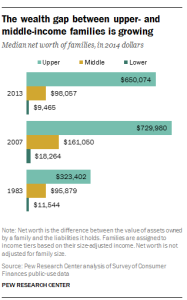If you went back in time 20 or more years ago and told the people back then that in the near future employers would force them to take a blood test or they would lose their health insurance coverage, I’m sure they’d laugh and assume you were citing some obscure subplot from Orwell’s 1984.
You see, not too long ago, if such a widespread policy was proposed, people would have been outraged and protests would have broken out nationwide to put an end to such a blatant invasion of privacy.
Not so in 21st century America. It looks like all the GMOs we eat, the fluoride in our water and the toxic mercury- and formaldehyde-laced vaccines we take willingly (or not so willingly, if you live in California) has left us brain damaged and semi-comatose.
We know our smartphones and TVs have taken a chunk out of our IQs, which may explain why 10 percent of college grads now believe that Judge Judy is a Supreme Court justice and some Americans think that Martin Luther King was the first black man on the moon. How else can we explain this epidemic of apathy and ignorance when it comes to our rights and freedoms?
We should have known we were in trouble when poor Edward Snowden hung his life out on the line to warn us about the criminal intrusiveness of our government only to have many Americans just shrug and say, “So what? I’ve got nothing to hide.” Hell, these pod people even parroted the government propaganda that he was a traitor.
I’m sure Snowden was even more shocked by our zombie-like reaction to our government’s widespread violation of the Fourth Amendment than he was when he discovered the extent of U.S. government surveillance. He obviously overestimated our present capacity for outrage and action.
So it should come as no surprise that corporate America wants to get in on the invasive fun. And why not? With health insurance premiums skyrocketing, it was only a matter of time before they would exploit our complacent idiocy by persuading employees to willingly submit to biometric screenings that measure blood pressure, weight, waist size, body mass index (BMI), cholesterol levels and other health vitals, or risk paying health coverage surcharges (as smokers already do) or losing coverage altogether.
So what if these wellness programs violate Equal Employment Opportunity Commission (EEOC) laws or the protected health information (PHI) provisions of the Health Insurance Portability and Accountability Act (HIPAA)? You’ve got nothing to hide, right? And, gee, what’s wrong with getting healthy and getting a discount on your employer health insurance coverage?
The Gift of Obamacare: Making Private Health Information Public
As if the Patient Protection and “Affordable” Care Act (ACA) wasn’t bad (and unconstitutional) enough by forcing you to buy health insurance from a private company under threat of tax penalties (?), we can also blame Obamacare for the explosion of invasive employee wellness screenings.
Surprised? Don’t be. After all, the ACA was written by the insurance companies and Jonathan Gruber, an arrogant, elitist jerk from MIT who laughed and admitted that the stupidity of American voters made this mess possible.
One would have thought that the Gruber fiasco would have been enough to inspire public outrage and force a repeal of Obamacare…but, again, you’d be overestimating the pod people who have body-snatched millions of once spirited, freedom-loving Americans.
The ACA helped advance the notion that healthy lifestyles would control health care costs; what seemed like harmless, even positive, rhetoric at the time has now been exposed as just another privacy-invading, money-making venture. It’s always about taking your money and invading your privacy with these clowns.
Anyone who has had a screening or physical in recent years knows that these examinations are designed to do one thing and one thing only…to make you a lifelong dependent on some hideously overpriced pharmaceutical drug that has 29 potentially lethal side effects (and the more drugs they can prescribe, safely or not, the better).
In 2014, 95 percent of employers had a health risk assessment, biometric screening or some type of wellness screening program in place, and 74 percent of the programs dangled an incentive carrot to get employees to participate (comply) usually a modest discount in health plan premiums.
Such high adoption rates by employers mean that these programs will now likely determine the course of your career. Good luck climbing the corporate ladder after your boss learns that you’re on an anti-psychotic and three blood pressure medications.
It’s Voluntary…Until it’s Not
Even if your company’s wellness plan is voluntary now, don’t be fooled. That’s how it always starts. Like a lot companies, Flambeau, a Wisconsin-based plastic maker, introduced their “voluntary” wellness program as a way to lower their health care costs and cut down on employee sick days.
But since wellness programs need high participation rates in order to get the best bang for the corporate buck, when participation rates are low, some companies are motivated to take off the kid gloves and make it a requirement for keeping insurance coverage. That’s what Flambeu did, and one employee who refused to participate in Flambeau’s program filed a complaint with the EEOC.
The Flambeu lawsuit is one of several such cases working their way through the legal system these days. The EEOC’s main argument in the Flambeu suit, and others like it, is that forcing employees to participate in wellness programs, especially when they involve biometic screening or health assessments, violates the Americans with Disabilities Act (ADA). The ADA prohibits companies from obtaining personal health information from employees or requiring that they submit to a medical exam. End of story, right?
Not so fast. For some reason, the U.S. District Court in Wisconsin didn’t see it that way. They ruled that data collected through wellness programs doesn’t violate the ADA. The EEOC is reviewing the decision, whatever that means.
Biometric Gene-ings and GINA
While the EEOC is leveraging ADA protections in its wellness program lawsuits, it’s also citing the Genetic Information Nondiscrimination Act (GINA), as it did in its suit on behalf of employees of Honeywell. Under GINA, employers are prohibited from requesting genetic information from employees, especially when that information is tied to health insurance coverage.
Honeywell employees turned to the EEOC after they balked at participating in the company’s wellness program and were slapped with a fat insurance premium surcharge. Employee spouses weren’t spared either; they were hit with a $1,000 tobacco surcharge for not coughing up their DNA, whether they smoked or not (guilty until proving innocent?).
Smokers know a thing or two about health insurance tyranny. Our poor, nicotine-addicted social pariah friends are always convenient canaries in the coal mine when it comes to test driving civil rights violations.
The EEOC cited both the ADA and GINA in the Honeywell case. And while the Minnesota District Court denied the EEOC’s request to issue a temporary restraining order against Honeywell’s wellness program, in its decision, the court expressed some concern as to how the ACA wellness directive would jibe with the ADA, GINA and other privacy laws. Ya think?
The courts are all over the place in these decisions (lower courts have handed out victories to both sides) and it’s hard to say when, or if, definitive judicial determination will ever emerge.
Employee Wellness Programs Can Hurt Your Credit Rating?
Another consideration: you may have noticed that your company hired an outside company to administer their wellness program. In addition to worrying that your boss will learn that you have high blood pressure, should you also be concerned that your info will be sold to a credit monitoring company or third-party marketer…and that your screening could affect your ability to get a car loan or mortgage in the future?
As it turns out, yes, you should be concerned, because wellness program vendors are not bound by HIPAA privacy protections.
If you read the fine print in their terms & conditions, you’ll find that many of these contractors have policies that allow them to share “identifiable data” with unidentified third parties “working to improve employee health.” Also, “de-identified” group health results are regularly shared with employers and researchers, and it’s been proven that this data can easily by “re-identified” and used for credit screening, marketing…or even… job displacement?
Think that Fitbit or other wearable fitness device makes you look cool? It turns out it also makes data mining your vitals that much easier. Nice, huh?
Health Care Employees VOLUNTEER their Protected Health Information
As an uninsured, underemployed freelancer, wellness programs didn’t ping my radar until recently when my client, a prestigious regional health care system, needed me to craft some employee communications regarding their wellness program.
The last time I was a full-time, salaried employee, employee wellness programs were strictly voluntary, so I didn’t give it a second thought. I quickly learned how much the ACA changed things.
Having worked in health care in some capacity for nearly two decades, I couldn’t believe that hospital personnel would agree to this madness. After all, these people would be terminated immediately if they violated a patient’s private health information, so why would they surrender their own private information? Shockingly, I learned many did just that.
I’m sure many workers realize this is a violation of their privacy, but they’re scared that if they don’t participate, they’ll end up on some undesirable human resources list (unfortunately, they’re probably right).
Others, who see themselves as being fit and healthy, may comply because they feel that they…wait for it… have nothing to hide. Good for them, but what if someone has a condition that they have a right to hide from the world?
What if you’re bipolar or diabetic, for example? Or, what if you have either condition, but don’t know it yet? Would you feel comfortable having your boss find out at the same time that you do? And how confident are you that you’d survive the next mass layoff if your biometric screening places you outside “normal” health levels in one or more categories? After all, there’s no way to prove that your condition would have had anything to do with your termination.
Don’t think for one minute that today’s corporate tightwads won’t weigh your health status when deciding if they want, or need, to part company with you, especially if they know that your fat medical bills will go with you.
Unfortunately, these days, the government and large employers don’t have to try too hard to push us toward controlled serfdom; they’ve handed us the shovel and we’re digging our way there ourselves, thank you. The powers that be have no need to fear torch and pitchfork mobs in the U.S. anymore.
No, the freeze-dried American zombie masses are content to drink beer, obsess over football and reality TV (our modern day bread and circuses) and to silently go along to get along. I guess as long as we have “nothing to hide” and Judge Judy is sitting on the Supreme Court, we have nothing to worry about.


